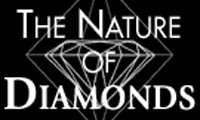 There are two aspects of moving diamonds from mine to dealer. The first is the fairly straightforward but important task of separating diamonds into gem-quality, near gem-quality, and industrial-grade diamonds. The second is the more intriguing aspect: the primary diamond marketing, which has been and still is largely controlled by De Beers Consolidated Mines, Ltd. through its majority control of the Central Selling Organization (CSO). The CSO sells a large percentage of mine production to diamond dealers; independent mines sell by closed bids and through private transactions.
There are two aspects of moving diamonds from mine to dealer. The first is the fairly straightforward but important task of separating diamonds into gem-quality, near gem-quality, and industrial-grade diamonds. The second is the more intriguing aspect: the primary diamond marketing, which has been and still is largely controlled by De Beers Consolidated Mines, Ltd. through its majority control of the Central Selling Organization (CSO). The CSO sells a large percentage of mine production to diamond dealers; independent mines sell by closed bids and through private transactions. Sorting occurs at every level of the market, from the mine to the jeweler. At the mine, the sorting depends on the sophistication of the operation and the size of production, but it is always based on grouping stones of like type. Diamonds are grouped into "sizes" -- more than one carat; "smalls" -- between 1 carat and 1/10th carat; and "sand," -- less than 1/10th carat, with some leeway for market pressures. Diamonds larger than about 15 carats are handled individually. Shape groups comprise "stones," "shapes," "cleavages," "macles," and "flats," describing characteristics familiar to the market. The ultimate purpose of sorting is to estimate an asking price for the rough diamonds.
Sorting occurs at every level of the market, from the mine to the jeweler. At the mine, the sorting depends on the sophistication of the operation and the size of production, but it is always based on grouping stones of like type. Diamonds are grouped into "sizes" -- more than one carat; "smalls" -- between 1 carat and 1/10th carat; and "sand," -- less than 1/10th carat, with some leeway for market pressures. Diamonds larger than about 15 carats are handled individually. Shape groups comprise "stones," "shapes," "cleavages," "macles," and "flats," describing characteristics familiar to the market. The ultimate purpose of sorting is to estimate an asking price for the rough diamonds.After great swings in diamond prices, the Diamond Trading Corporation (DTC) was set up by De Beers in 1934 to handle the actual sales of diamonds. The DTC and the Diamond Producers' Association (the mine operators) form the nucleus of the Central Selling Organization. The CSO stabilizes prices in hard times and raises them in accord with inflation and demand during good times. It needs considerable wealth and stockpiles of diamonds to maintain this position, but this "single channel marketing" system has been an effective cartel. In the United States cartels are illegal, so De Beers cannot operate here. However, the company's interests are represented by a public relations office, the Diamond Information Center, and indirectly by the diamond dealers and jewelers who sell the gems.









No comments:
Post a Comment